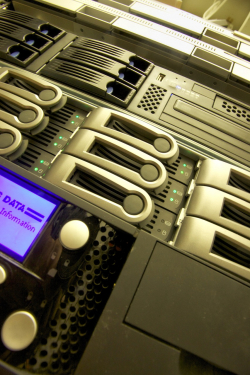What is a Dedicated Server?
 When dealing with the various web hosting products on the market, sooner or later you will come across the term Dedicated Server. But what exactly does this term mean and how does such a server differ from other web hosting products?
When dealing with the various web hosting products on the market, sooner or later you will come across the term Dedicated Server. But what exactly does this term mean and how does such a server differ from other web hosting products?
What is a Dedicated Server?
The term Dedicated Server, or dedicated server in English, refers to a physically independent server. This server is specifically used for a particular purpose or by only one individual customer, providing them with exclusive access to all available technical resources.
Therefore, a dedicated server can be dedicated to a service or dedicated to a customer. For example, a server serving a specific purpose could be a database server or an email server. A server used exclusively by a single customer could be hosting an online shop on its own Dedicated Server.
This sets the dedicated server apart from other hosting products, such as Virtual Private Server (VPS hosting) or Shared web hosting, where multiple customers have to share the actual hardware resources. Furthermore, the ability to make deeper administrative settings is not available in these cases.
The high performance and extensive administrative capabilities naturally impact the costs involved. As the customer acquires exclusive usage rights with a dedicated server, the monthly costs for the server are generally higher than with other web hosting products. When it comes to the hardware aspect of the server without software such as the operating system, the term Bare Metal Server is often used.
Advantages of Dedicated Servers
Dedicated servers offer a range of advantages over virtual servers or shared hosting packages. Especially for professional users running extensive commercial online projects, opting for a dedicated server despite the higher costs is a common choice. This is due to the following reasons:
Enhanced Security
With a Dedicated Server, only applications used by the operator run on the server, minimising the risk of security vulnerabilities. Additionally, exclusive access to the server ensures that no one else can access the existing files or log files.
Custom Administration
The entire administration of a Dedicated Server is in the hands of the operator. They can make all system settings themselves and tailor them optimally to their own requirements.
Custom Software
As part of managing a Dedicated Server, the operator can freely choose the software used. They can select any operating system and individual server services themselves.
Higher Availability
Unlike other web hosting products where technical resources are shared with other customers, a Dedicated Server offers higher availability. Outages and downtimes cannot be caused by other users.
Faster Speed
Not only does a Dedicated Server offer higher availability, but it also performs better in terms of speed compared to other web hosting products. Since no one else is using the available hardware resources, they are always 100% available to the operator.
Optimal Search Engine Optimization
In general, a Dedicated Server also offers advantages in the field of search engine optimization. Since the server has its own IP address and no other online projects are hosted there except the operator's project, a signal of higher quality is sent to search engines like Google.
What are dedicated servers used for?
Dedicated servers are used for a variety of applications. In general, the use of a dedicated server is always worthwhile when implementing an extensive online project or operating a particularly important online service.
For example, dedicated servers are used in large networks where they are used for specific tasks. Database servers are dedicated solely to accessing databases, Email servers exclusively handle all email traffic in a network, and Name servers are responsible solely for the name resolution of the Domain Name System (DNS) on the Internet. A GPU server integrates graphics processing units (GPUs) instead of or in addition to conventional CPUs to be specifically optimized for computationally intensive tasks that benefit from parallel data processing.
In the field of web hosting, customers opt for dedicated servers when hosting online projects that, for example, expect extremely high visitor traffic, have a complex management structure involving many, often simultaneous, database queries, or in general, when there are particularly many computationally intensive tasks.
Examples of using a dedicated server in web hosting include:
- Online shops with high visitor traffic or a large range of products
- Communities such as popular forums or social networks
- Web services such as email services or booking platforms
Types of Dedicated Servers
Dedicated Servers come in all imaginable variations. Hosting providers typically offer their customers different equipped options. Depending on the required level of performance, customers can then choose the appropriate server model. Dedicated Servers can be distinguished based on the following performance criteria:
- Processors: CPU power and processor cores
- Memory: Available RAM
- Hard drives: Available storage space
- RAID system: Integrated backup system for hard drives
- Operating systems: Linux or Windows
So, the choice of server solution for a customer ultimately depends on various criteria. Dedicated Servers are definitely an important part of the wide range of offerings in the web hosting market and are particularly interesting for users in the professional sector.
Image credit: LoboStudioHamburg / pixabay.com / CC0 Creative Commons
Write a comment
- Server
Tags for this article
More web hosts
More interesting articles
FreeBSD as Server Operating System: What can the powerful open-source project do?
The following article aims to shed light on the unique features of the open-source project FreeBSD as a server operating...
What types of servers are there?
What different types of servers are there and what are they used for?




